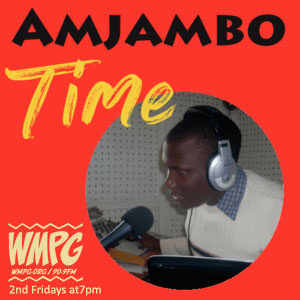 On January 14, Amjambo Africa and University of Southern Maine radio station WMPG will launch “Amjambo Time” as part of WMPG’s new Global Mainers initiative. Hosted by radio professional and Amjambo Africa News Editor Jean Damascène Hakuzimana, three pilot episodes of “Amjambo Time” will broadcast once a month in January, February, and March, on Fridays at 7 p.m.
On January 14, Amjambo Africa and University of Southern Maine radio station WMPG will launch “Amjambo Time” as part of WMPG’s new Global Mainers initiative. Hosted by radio professional and Amjambo Africa News Editor Jean Damascène Hakuzimana, three pilot episodes of “Amjambo Time” will broadcast once a month in January, February, and March, on Fridays at 7 p.m.
“When we talked about languages that can connect with a lot of immigrants in Maine, we thought about Kinyarwanda. In Burundi, Rwanda, Congo, and other tribes in Eastern Congo, they speak a kind of Kinyarwanda. This could be a language we will broadcast in, other than English. But we are not solely focused on East Africa – or even the continent at this point. Amjambo is interested in speaking to and about all immigrants in Maine. So, the language possibilities are many.”
“Amjambo Time” will include stories from Amjambo Africa’s printed content. “This is an effort to bring our reporting to a wider audience. And we hope people will gradually make listening a part of their week,” said Amjambo Africa Editor-in-Chief Kathreen Harrison. “We are trying to reach deeper into the communities we serve, and we believe that our Africa news editor, with his background in broadcasting, is the perfect person to do that.”
Over time, Harrison and Hakuzimana hope “Amjambo Time” reaches listeners from many different communities, including Spanish speakers, French speakers, Arabic speakers, the growing Afghan community, the AAPI community in Maine. The three-part pilot is supported, in part, by a Democracy, Journalism, and the Informed Community Grant from Maine Humanities Council. Raising additional funding will allow “Amjambo Time” to expand with other hosts, other languages, and other types of shows, such as music, culture, sports, and business.
“Amjambo Time” will include stories from Amjambo Africa’s printed content, including news from the continent. “This is an effort to bring our content to a wider audience.
This is the first of several programs within WMPG’s Global Mainers project, which is part of the station’s larger Community Counts Initiative Project to address diversity, equity, and inclusion, and to increase visibility and service to the underrepresented populations within the station’s listener range. A Global Mainers show highlighting Indigenous voices from Maine also starts in January, and a podcast is planned for USM students to share their own stories.
Global Mainers Program Coordinator Sebastiane Sacerdoti-Ravenscroft said, “My goal is to identify historically underrepresented communities and give them a voice on radio or podcast, depending on what platform they would like to be a part of.” A graduate student at USM, Sacerdoti-Ravenscroft is also a diversity, equity, and inclusion specialist at MaineHealth. “My day job is education. Ally-ship in the workplace,” they said, for race, gender, disability, age, and other protected classes. “If you are an ally for one, you need to be an ally for all. Which is also what drew me to doing the Global Mainers project. … I like giving platforms to voices that don’t normally get heard.”
WMPG has been working on the Global Mainers idea since early 2021. What began with advertising in Amjambo Africa to attract new listeners evolved into the station approaching the newspaper about a partnership. WMPG leaders liked the idea of having someone from the newspaper on the air, and the publisher and editors of Amjambo Africa had been looking toward a deeper presence on radio, too. And so, “Amjambo Time” was born.
Hakuzimana’s background in radio made him the ideal choice to host the show, along with his ability to speak five languages (Kinyarwanda, English, French, Swahili, and Kirundi). He holds a bachelor’s degree in journalism from the National University of Rwanda, worked as a broadcast reporter, talk show host, editor, and producer for over six years in Rwanda, and has numerous journalism contacts in more than 10 African countries. He also earned a master’s degree in community development from the University of New Hampshire in 2020. Because of his extensive experience, Voice of America calls on him to contribute analysis, such as about the Tigray conflict in Ethiopia and the recent death of the president of Chad. They know he is familiar with the countries and has reported on events like these for Amjambo Africa. As far as Hakuzimana knows, he will be the first African-born radio host on the air in Maine. He knows some other broadcast journalists from Africa, but right now they still are working to establish their new lives in Maine. “When you arrive here, you need first of all to fight for survival,” he said.
In addition to widening the audience for the newspaper, Hakuzimana said, “we are aiming at fostering the diversity, the inclusion, the societal acceptance and reception – which, to my view, is another way of helping the cooperation between New Mainers and Mainers. People deserve to know what’s going on, why people are coming to Maine. They deserve to know that they come with rich culture, rich beliefs, from civilizations that are rich in nature.” He intends to interview some New Mainers in leadership positions. At the top of his wish list is Deqa Dhalac, the newly elected mayor of South Portland and the first U.S. mayor who is a Somali-born, Muslim woman.
Harrison, Sacerdoti-Ravenscroft, and Hakuzimana are enthusiastic about the show. “I’m excited to see how this will evolve,” host Hakuzimana said. “And I would like to wish us good luck! I do believe that more people will be interested to chip in and make it something to go beyond [the pilot]. Immigrants have a lot to share. It’s a matter of opening up the medium, the channel. This is another component to explore.”
“Amjambo Time” will be broadcast live on 90.9 FM in the greater Portland area and online at www.wmpg.org/listen/. Shows will be available as podcasts on www.amjamboafrica.com.
Jean Damascène Hakuzimana’s most recent interview with Voice of America was on November 28, 2021. The topic was the conflict in Ethiopia and its potential to destabilize countries in the Horn of Africa. Here is an excerpt from what he said:
An unstable Ethiopia means havoc in the region. Belligerents should negotiate peace to avoid the worst of the conflict, though talks seem unlikely to happen. Should Addis Ababa fall to the Tigrayan army, they would take revenge against Eritrea, and consequences would be dire in the region of the Horn of Africa, which was already a ground zero for conflict. There is a risk that the war in Ethiopia gave momentum to the Islamic Al-Shabaab terrorists in Somalia, where Ethiopian Defense Forces were fighting this group. An influx of refugees has crossed into Sudan, a neighboring country suffering from prolonged and sporadic unrest since the fall of Omar Bashir. Kenya in the south is on the waiting list to host refugees should the war progress towards the south of the country. Djibouti in the northeast has the main road for transiting goods from the sea to Ethiopia – all sides in the conflict would need to control that road. Last is South Sudan, battling with its own internal problems since its birth as the latest and youngest nation of the African continent. In brief, Ethiopia has been holding the center of stability in the region until now.
To listen to the interview, conducted in Kinyarwanda: www.radiyoyacuvoa.com/a/6312213


